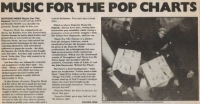A Very Successful 'Cult' Band
1987
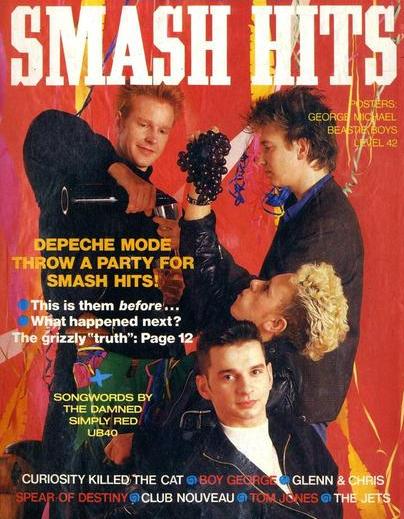
Smash Hits 6th-19th May, 1987 issue cover
SINGLE REVIEW
STRANGELOVE - released April 13, 1987
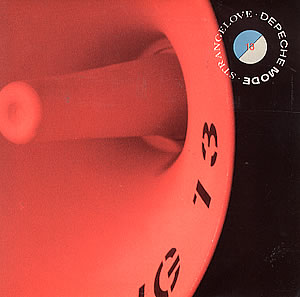
No reviews currently available.
ARTICLE
Dep jam
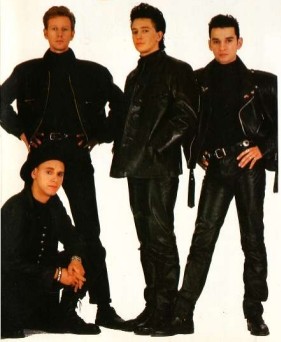
by Francesco Adinolfi
Record Mirror, 22nd August 1987
_____
Dust down your leathers, get your mum’s bra stuffed with paper hankies: Depeche Mode have a new single out. Bella bella says Francesco Adinolfi. Photo by Anton Corbijn.
As inevitable as night following day, Arsenal sending people to sleep and the Tories winning the last election, Depeche Mode are releasing a single. As inevitable as all the above and more, that same single will be a hit. Following the success of ‘Strangelove’, the band are now back with ‘Never Let Me Down Again’, to be followed in the autumn by a new LP. While never actually having had a flop single or album, the Mode – as they are affectionately referred to – seem to have fought back from a series of disappointing chart positions (by their standards) and are bright and eager and raring to go. Still straddling that uneasy line between teeny-bop pop stars, a ‘lad’s band’ as demonstrated by the hordes of casuals who attend their live shows in Britain (well, they are Chelsea supporters after all) and serious exponents of high quality even arty synthesized music, there are few who have not yet formed an opinion of them. So what’s been happening in the Mode camp? Is the new LP to be a radical departure in style? Will they be touring soon? And is Martin Gore still wearing that silly skirt or has he progressed to bra and sussies yet?
"We’ve been taking it easy," says Andy Fletcher. "We recorded half the new LP in Paris. It’s hard to speak about the style of the record but the songs are really good, it contains various moods. We’ve recorded 15 songs of which nine or 10 will end up on the album. The title’s ‘Music For The Masses’. I think it’s a very good title."
Why?
"It’s a bit tongue in cheek really. Everyone is telling us that we should make more commercial music, so that’s the reason we chose that title."
Who buys Depeche Mode records these days?
"A whole cross section of people. We’ve been going for six years and we’re gaining fans all the time – many grown-up people. Hopefully we’re improving all the time, but it’s very hard for us to be objective – we’re constantly striving for perfection. One day we’ll reach it, perhaps."
What would you call perfection?
"To have an album which will be regarded in 10 to 15 years’ time as an excellent pop album. I think we made some good pop albums. I think ‘Some Great Reward’ is a good pop album. ‘Construction Time Again’ as well… I feel our albums have simply got better."
Depeche Mode could, in a way, be seen as a very successful ‘cult’ band. Is this how you see yourselves?
"Probably we’re still a cult band because we find it difficult to cross over to anyone except our fans,’ says Andy. "I suppose we’re still a cult group, we’re still on a small record label… There are a lot of people who like bands when they’re small, when they can go and see them in a small club. As soon as a band becomes bigger they forget it and go on to another group."
"I think it’s nice to be more of a cult band than a hugely successful group," says Martin Gore. "I think you can get more out of it and it’s a nicer feeling in some way, you’re not really a loser though many people might say it."
What mistakes have Depeche Mode made in the past?
"I think we made a big mistake in Britain," Andy answers. "In the early days, we were very young and naïve and basically we did everything – every teenage magazine, every TV show…"
Martin: "Everybody would come up to us and say, ‘Can we have an interview? Pictures?’ And we’d say yes. It backfires. It’s taken the group four years to get back to a good situation."
What hurts you most about England these days?
"The violence," says Andy immediately. "The risk of physical violence. I think you should be able to walk in the streets – naked – and not get any aggravation. I think in Britain there is a definite violent aura around."
"It’s just the British character," comments Martin. "We’ve always been violent and we always will be, but there are also good things about Britain. Our friends are here, our families."
Do you still see Depeche Mode as an experimental band?
"We always take risks," says Martin. "Pretty much. A lot of our singles don’t get played on the radio. ‘Blasphemous Rumours’… even songs like 'Shake The Disease', because of the titles, didn’t get any airplay.
"What people don’t realize is that it’s not that easy to make a single. Take George Michael for instance. He has a big name. But would ‘Careless Whisper’ have been a massive hit if you had given that to some unknown Italian singer? Even if we had released it, it wouldn’t have been a huge hit. They would have said it was boring. It’s so successful because it’s George Michael. When we released ‘A Question Of Lust’ they said it was dreary, but that was a great ballad."
Generally in groups, the person who writes the most is the one who decides what everyone else does. True or false? Martin?
"Not if you’re as weak as me," he answers, grinning. "Ha ha ha…"
Reprinted WITHOUT PERMISSION for non-profit use only. Photo by Anton Corbijn reproduced without permission.
SINGLE REVIEW
NEVER LET ME DOWN AGAIN - released August 28, 1987
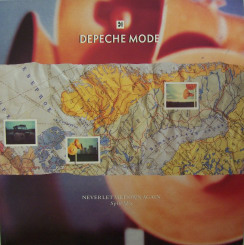
"So often The Mode thump out the same old synthesized ploddings but this one's definately more memorable because it's... well, it's creepy. Shiver your spinal "column" to the hollow, jaggy and sinister toots, shake in your sandals at the eerie 'n' horrible choir-sound searing over the top of it all, and then ponder the sentence "Promises me I'm as safe as houses/ as long as I remember who's wearing the trousers". The b-side of this is quite a good disco belter too."
Unknown reviewer
Smash Hits, August/ September 1987
Reprinted WITHOUT PERMISSION for non-profit use only.
ARTICLE
The Dire Straits of
the synth generation?
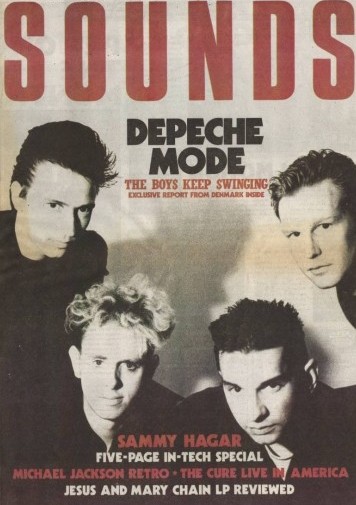
by Jack Barron
Sounds, 5th September 1987
_____
Inflatable dolls and perverted acts… it’s enough to make you wilt. Jack Barron joins Depeche Mode in Denmark and discovers how synth-sex has made them well-dressed rich men. Mass appeal Russell Young.
THE SUN rises just after five in the morning.
As a freshly finished glitter-mix booms, "Everyone’s looking for a reason to live/If you’re looking for a reason, I’ve a reason to give/Pleasure little treasure," from the beatbox at the wheatfields outside, Martin Gore’s manic laugh can be heard.
The guilt-edged songwriter has arrived back at the jacuzzi, sauna and swimming pool complex housed in the Puk Studios, deep in rural Denmark.
The night has been a long and amusing one.
Earlier, a dumb blond boy, rumoured to be a gun-runner, lost a 5,000 krone bet in his local club. He didn’t believe he was in the presence of Depeche Mode until a fan with a poster turned his supercilious smile into a scowl.
Martin alights from the taxi and goes to the house he’s sharing with Andrew Fletcher as the A-side of Depeche Mode’s single "Never Let Me Down Again" puts a straight back in the local corn. He tries the door to his bedroom. It’s locked.
Inside a surprise is lurking.
Two houses away, I’m listening to the nearly completed "Music For The Masses", the band’s forthcoming LP.
"Hahahahaha!" Martin’s filthy chuckle precedes him. The door is flung open.
"Somebody’s locked me out. Come on, Jack, this is your doing," he accuses. But I haven’t a clue what Martin is talking about.
A key is located. Martin romps into his room. A figure is curled up under his duvet. Somebody is sleeping in his bed. Martin rips back the bedclothes. A startled inflatable sex doll looks up at Martin. Martin looks back, eyes bulging with mirth. It’s a present from photographer and video maker Anton Corbijn.
Gore’s gurgling laughter erupts like a sewer bursting.
DEPECHE MODE in person are not what you’d expect.
Indeed, before meeting them I had no preconceptions about the personalities that make up Depeche Mode. Others do though. In one singles column, Westworld idiotically slated DM on the mere basis that they hated the weird bloke who always wore a dress – namely Martin.
It’s typical. Depeche Mode are often viewed as lepers in their own lifetime by many in the British music biz. That spite intrigued me, as did DM’s ability to remain managerless on the indie ideal of Mute and still sell vast quantities of records in Europe and America.
Most of all though, what propelled me to Denmark was the songwriting abilities of Martin Gore.
Gore – nickname Curly or Poof? – is far from fey; indeed, the complete opposite.
Always wanting to go one step further to add to an evening’s delights, he’s likely to strip naked at the drop of an empty vodka bottle and sod the company – even if it’s a gaggle of German journalists gathered to see them presented with a handful of gold records.
Ultimately, what counts nowadays is why Depeche Mode regularly pick up such awards abroad. And that’s down to Gore’s sometimes brilliant songwriting rather than nudism. After all, a quick flash never sold a record.
Mind you, when DM’s initial burst of "New Life" was followed by the departure of Vince Clarke, many expected the group to be an insignificant flash in the pan. Six years later they’re planning their biggest world tour yet.
It isn’t difficult to cite the secret of DM’s longevity.
"Hard work and good songs," they tell me.
But it’s the nature and synth/sampled presentation of the songs that has set them apart so far. If I mention a few titles – "Shake The Disease", "People Are People", "Leave In Silence", "Master And Servant", "Blasphemous Rumours" – I bet you can sing the choruses. Memorable melody meets high technology in the Modes.
There is also an open wound of humanity in Gore’s lyrics, many of which deal with communication breakdown. His compositions might be straightforward but they are never simple.
As such, they rank among the best offered on the altar of pop this decade.
"It’s true that many Depeche songs deal with communication problems," agrees Martin. "There are a lot of recurring themes in my songs. One thing that always reappears is disillusionment and lack of contentment. A lot of the songs also deal with a search for innocence.
"I’ve got this theory that as you get older you get more disillusioned and that your happiness peak is when you’re in your teens. As you grow older and learn more, the corners are rubbed off your life."
How do you get yourself out of this rut?
"We don’t," laughs Gore. "I think we exploit the rut instead by writing songs about it. We’re making money out of the rut that we and others are stuck in, hahahaha! In fact, we’re craving for something more depressing to come along to take us out of our boredom, hahaha!
"As you can see we’re such an up band at interviews." Gore lets forth a giant belly battering giggle. "I think that the only reason we sell more records abroad than we do in England is because foreigners don’t understand us. They just hear us laughing every now and then and dig it, hahaha!"
"MUSIC FOR The Masses" isn’t a rib-tickler. It is, however, a turning point for Depeche. The band acknowledge it’s altogether less "offensive" and "controversial" than some of their earlier work, which is a bit of a disappointment.
With this LP they hope to reach a mega-audience, because Depeche Mode won’t be satisfied until they’re the Dire Straits of the synthesiser generation.
Yet the melodic flair and maudlin lyricism, which earned them the monicker Depress Mode around the time of the "Black Celebration" LP, remains intact. So does the ever-present tension between the band’s pure pop approach and experimentalism. This is exemplified by the current single in the contrast between the ethereal "Split Mix" and the headspinning amyl "Aggro Mix".
"Never Let Me Down Again" will doubtless fly sky-high everywhere, including Britain where the band’s last ten singles have stiffed in the teens.
"Maybe, but I bet we’ll still continue to offend a lot of people in Britain after that – which is strange because you’d think we’d be the last band to offend people. Yet we’re probably the only band to get constantly slagged off by DJs on daytime Radio One," reckons Andrew Fletcher.
Fletch is the Mr Straight of Depeche, the Baden Powell who was in the Boys Brigade till he was 18. He is the organiser.
This strange blind hatred Depeche put down to mistakes in the early years of their career.
"We didn’t know what we were doing at the time, we were young and naïve," explains Dave Gahan.
"We’d do any interview and TV show no matter how moronic and that legacy still hangs over us like an albatross in Britain."
In 1983, even Depeche finally became sick of promoting themselves in a lame-brain way.
"What we’ve really tried to be aware of is getting on people’s nerves by over-exposing ourselves," says Alan Wilder.
Alan is a calm man who the others reckon is the resident mystic and Yogi of the band. He equally calmly denies this: "What a bunch of crap!"
SINCE THOSE days, they’ve kept a low public profile in the UK. Interviews have been few and far between and the music has been allowed to speak for itself.
This doesn’t mean that the fiercely indie-loyal Modes aren’t averse to using the music business machinery when it suits them – a move which can backfire.
Such an occasion was when Dave agreed to be interviewed by the Mirror’s hapless Gill Pringle at this year’s Montreaux Festival. While Gill Pringle’s infamous Beastie Boys Sneer At Crippled Kids feature took the slimelight of the week, her encounter with Dave went unnoticed by all but Gahan’s family who were mortified.
"I don’t regret many things, not nicking cars when I was a kid, but I do regret that story," Gahan explains.
"I thought it odd at the time that she only wanted to talk about my family. Anyway, I told her about how my dad left home when I was real young, how me mum remarried and how that (step)dad died. And I told her that after that my real dad came to visit me for a while and then left.
"Out of this she got her facts wrong and spun this heartache story of how I’d been searching for me dad for 20 years and how every time we went on Top Of The Pops I hoped he’d see me and get in contact. It was utter shit.
"My dad has known about my career from the beginning and is really proud of me.
"He is over 70 and has had a stroke. He also reads the Daily Mirror. So you can imagine the pandemonium in his household when a paper arrives and has a story about how I’ve been looking for him for 20 years. My relatives tried to keep the paper away from him, the story could have finished him off. Bastards."
Once bitten, twice as annoyed.
Given the amount of chart hits they’ve had in Britain, another intriguing aspect of Depeche is how they remain outside the dribbling gossip columns of the tabloids.
They don’t belong to the mega pop-beergut pack that eats, drinks, screws and fights in the glare of flashbulbs then drops everything to appear on yet another charity record. Depeche worldwide outsell many of these falling stars come liggers yet go their own quiet way.
A spot on the Prince’s Trust shebang? They laugh at the idea. Why? Because they want to and can also afford to.
SO HOW much money have you earned Depeche?
All: "That’s a private matter. We’ve made a few bob."
Awwww! OK, what have you spent your money on?
"At the moment we don’t really need any money because we’ve earned quite a bit," elaborates Fletch, whose accountant invested in South African gold for him without his knowledge, a blunder he wants to rectify immediately.
"The problem is in 20 or even ten years’ time we might need money," continues Fletch. "So what we decided generally as a band to do was to invest our money in pensions so we’ll get something when we’re 50 or 55.
"When bands earn a lot of money people resent it. We’ve been going six years which is a long time in this business. When you’re working in a band the money you earn will hopefully sustain you for the rest of your life.
"Although jobs are getting slightly more available now, what kept us going, I think, subconsciously three or four years ago was the thought of, What could we do if the band split up? Generally speaking, none of us are suitable for a nine to five job anymore, if we ever were."
"I don’t think I’ve spent my money on anything particularly outrageous or stupid," volunteers Martin. "I don’t drive but I’ve got a decent house, not a mansion. Those two commodities are what rich people spend their money on. I haven’t got a boat, hahahaha!"
Dave has bought himself the predictable comfortable house and a Porsche 911 Targa.
"I look upon the car as an investment," he smiles, "but it’s bloody fast and the way I drive it’ll soon get wrecked and become a bad investment."
THERE'S A line on the song "Nothing" on "Music For The Masses" which runs "What am I trying to say/I’m not trying to say anything you didn’t know when you woke up today" [sic]. Detractors will no doubt pounce on this as evidence of creative bankruptcy when the LP is finally released in mid September. The Modes see the lyric as symbolic.
"I think that the line is true about all our songs," says Martin. "If you’re writing a good song you’re not telling anybody any new information. All you’re doing is putting down hopefully shared feelings that somebody else can agree with."
So what would you tell Westworld?
Dave snorts at the mention of them.
"They’re just a typical group desperate for attention who decided to get it by slagging us off," he sneers. "But look at what has happened. Westworld are under the Where Are They Now? File, but tough shit. We’ve seen hundreds of bands like that come and go. We, however, will still be going and growing in the years to come."
The plastic blow-up sex doll declined to comment directly and instead let forth a sigh of air in agreement.
She’d been let down again.
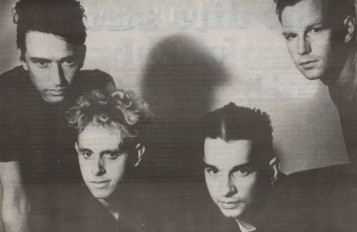
Reprinted WITHOUT PERMISSION for non-profit use only. Photo by Russell Young reproduced without permission.
ALBUM REVIEWS
MUSIC FOR THE MASSES (LP) - released September 1987
Rubber Bullets
"The peculiar Frenchman Bellia informs me that French youth refer to this combo as Depede Moche, which apparently means something like Dirty Paedophiliacs. That’s just typical of the ridiculously rabid spleen that DM engender amongst usually right thinking folk, a contempt that most of their records thus far have dispatched straight back down critical gullets.
"Music For The Masses" sets itself up more than ever for body blows and vitriol, Depeche Mode having finally ditched the delicious rinky-dink finger pop for something more grown up, more sensible. Gone is the flashy simplicity of "Just Can’t Get Enough", the objective debauchery of "Question Of Lust", the deep and meaningful semiotics of "People Are People". Now Depeche Mode write "Pimpf".
"Pimpf" is a silly, sassy thing, rounding off a record that’s seamless, fluid, and, once the lights are out, particularly dull. And yet, once you flick every switch in the house, you can almost see the appeal of their newly found bogus economy. Titles have shrunk, the words that embrace them hurtling minimally in a completely different direction to the increasingly fussy tunes. Songs like "Sacred" and "Strangelove", with their two-word lines, and their full face posturing, sound like Swans backed by a barrel organ which, I have to admit, is no bad thing.
"Never Let Me Down Again" might yet prove to be the most durable of their singles, its rhymes never bursting far above Pam Ayres, but its unselfconscious simplicity stopping the fist pulling instinctively back. "The Things You Said" and "Behind The Wheel" ("I’m going cheap/Tonight") may never scale the foothills of poetic beauty, but retain a simple beauty that’s hard to resist.
It’s not what I waited for, and it’s never going to be the best of ammunition for barroom arguments over Pop’s Grubby Tapestry, but I’ll keep it around for a bit. Let’s just hope they don’t start going to Sunday School."
Paul Mathur
Melody Maker, 3rd October, 1987
Reprinted WITHOUT PERMISSION for non-profit use only.
See the original review here
Music For The Pop Charts
"Depeche Mode: you shouldn’t be paranoid. People really do hate you.
Depeche Mode: the original prole art threat, the Basildon boys who dressed their electric dreams in furtive black leather and prayed that no one would see the join. Depeche Mode, the boys who missed the post-modernist bandwagon by that much, consoling themselves with subcultural ephemera to paper the cracks – the skirt, the lipstick, the S&M efficacy that bought your kid sister. And they only wanted to be loved. Strike that. They only wanted to be taken seriously…
And here they are, raising the corporate red megaphone on this their sixth – yes, sixth – album, a token nod to chainstore totalitarianism with which they hope to sledgehammer the Euro-market and presumably enslave a public hitherto inaccessible to them.
A pipe-dream, of course. Depeche Mode lack the will or the wit to push for the kind of dramatic intensity that even Freddie Mercury can rustle up. Depeche Mode are caught in limbo, too busy exploiting their product as a cultural gimmick to realise what’s at stake here. Because it’s simply too easy to take the route they’ve chosen, too cheap to peddle your wares with such a cynical disclaimer. You can’t have it both ways…
Which is where Depeche Mode fall. Mightily. Always have done, touting their immaculate pop sensibility whilst raising a protective screen of artistic integrity, a little dirt behind their fingernails, shall we say.
"Music For The Masses" is a missive from the designer doldrums, which nonetheless betrays the broadest clues so far given of the Depeche Mode predicament, the schizophrenia that sees high-art pretensions chafe commercial considerations. Which sees the chartbound sounds of "Strangelove" and "Never Let Me Down Again" rub shoulders with the primitive, Germanic waltz of "Little 15" and the John Barryesque "Behind The Wheel".
But there’s a heart beating here: "They know my weaknesses/I never tried to hide them", sings Dave Gahan on the stunning "Things You Said"[Martin sings lead on this track - BB], a world away from the laconic wind-up of Neil Tennant’s deadpan whine, the voice that brought us the ultimate post-punk statement: "I love you, you pay my rent".
Depeche Mode: the disco in discord, the rhyme that pays.
Depeche Mode: great pop, bad art. Get the balance right." ****
Damon Wise
Sounds, October 1986
Reprinted WITHOUT PERMISSION for non-profit use only.
"After six albums (not counting last year’s "Greatest Hits") and a few thousand singles, you might expect the "Mode" to be full of "artistic exhaustion" and all those things that befall groups when they’re a bit old. But not for these pop chirperers! (Apart from Alan "Wild"er, that is). "Music For The Masses" is the "Mode"’s most consistently excellent record yet – as tuneful and thoughtful and moody (especially moody) as anything they’ve created before. There’s the bellowing, hypnotic single, "Never Let Me Down" [sic], the startlingly glum "The Things You Said", the rather threatening "To Have And To Hold" and seven other glimmering diamonds, the most shiny being "I Want You Now" – a dreamy ballad on which the "Mode" make very dubious puffing noises as though they were blowing up a paddling-pool. Magnificent!!?"
John Barty
Smash Hits, October 1987
Reprinted WITHOUT PERMISSION for non-profit use only.
"With the relative failure of ‘Never Let Me Down Again’ in the singles chart, some may be ready finally to bury the last nail in the Depeche Mode coffin. Yet common consensus among all, bar the record buying public, would have it that this latest D Mode 45 is perhaps the best thing they have ever done. The fact is that this dark, sensual track is probably far too disturbing for the Rick Astley fans among us and though it points to a more mature Depeche Mode, it may well be the beginning of the end of the common misconception that they are a ‘girly synthesiser’ band. Features in ‘serious’ music papers may have come and gone, but only stark chart failure will finally secure one of the most consistent bands of the last few years a place in the hall of ‘credible chart’ fame.
‘Music For The Masses’ is, therefore, a contradictory title. It is far from that at this moment in time, for it contains an overall feeling of dissatisfaction, paranoia and vulnerability, far too warm and intelligent for that yardstick of what the masses want (ie: the charts). Instead, you find yourself once more entering into the Martin Gore vulnerability landscape, none more so than in the poignant ‘The Things You Said’ or ‘I Want You Now’ which features a monastic chant over which Gore sings what amounts to a homage to getting your end away. The act of shagging elevated to religious proportions, ending on the most basic of human obsessions, a full coital groan.
Tracks like ‘To Have And To Hold’ may verge on the dirgy, ‘Little 15’ may remind you of a curious Eighties Brechtian drama, but Depeche Mode still manage to make the cold warm and the electronic human.
Martin Gore’s presence seems even more to the fore on this album; his voice becoming richer and more forceful, while Dave Gahan’s vocals descend ever downward and butchward into Iggy Pop territory. One reason why ‘Music For The Masses’ is possibly the most accomplished and sexy Mode album to date. The masses may not be willing, but the flesh is certainly weak…" ****
Eleanor Levy
Record Mirror, 3rd October, 1987
Reprinted WITHOUT PERMISSION for non-profit use only.
Basildon Bondage
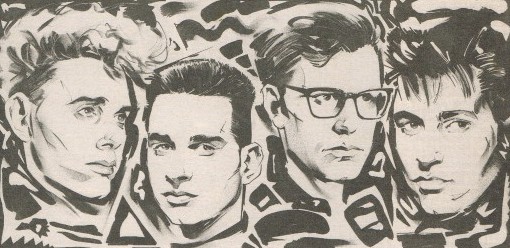
"Personally I couldn’t care less whether The Pet Shop Boys are gay or not. What I want to know is, are Depeche Mode perves?
Here they are, six years on and with six albums under their studded belts, and they still look about nine years old! But their minds – well, their minds are veritable sewers. Leastways, songwriter Martin Gore’s is, and the rest of the Modes appear to encourage him, happily singing and playing his bizarre songs.
Martin Gore is the Depeche Mode with the fluffy blonde hair and the penchant for wearing leather mini-skirts. Nothing wrong with that. After all, isn’t that what rock’n’roll is all about – a man in a leather mini? Gene Vincent camped it up in leather and a leg brace, Martin Gore camps it up in lipstick, dangly earrings and a leather skirt. Depeche Mode are unashamed pop entertainers, and this has been the key to their long success and the reason why Martin Gore has been able to develop his strange carnal visions and keep the Depeche Mode audience happy.
Depeche Mode have never lost sight of the debt to pure pop which original songwriter Vince Clarke left them with. The lyrical content, in Gore’s hands, may have got progressively more weird since "New Life" and "Just Can’t Get Enough", but the music is as sharp and accessible as it ever was. Depeche Mode plugged into the enormous potential of electronic pop and stuck with it while other synth bands who rode that ’81 crest with them floundered.
There are not so many bands who have the ability to score a hit single with an S&M song, "Master & Servant". Having the teenies and their big sisters dance around their handbags shrieking, "Let’s play/master and servant…" was Martin Gore’s finest hour. Mind you, he and the Modes nearly came a cropper when they pushed it a bit further and released a single titled "Shake The Disease". Not much air-time for that one. A shame, because it was one of their best singles. Gore then toned it down slightly by writing a single called, "Stripped" and making the lyrics some hash about getting back to nature rather than simply just getting the collective knickers off. But even so, eyebrows were still raised by the puritanical powers that be.
In Britain, Depeche Mode will probably always be seen as nine year olds from Basildon who make pretty tunes on pop keyboards. The critical respect and mass adulation they command in Europe, the Far East, and parts of America escapes them here. But they should worry…
I’m pleased to see that on "Music For The Masses" Gore is at his obsessive best. Every single track is steeped in sin of one sort or another. For me, the recent single, "Never Let Me Down Again" is still an intriguing masterpiece, combining homo-eroticism with drug euphoria. Get that line: "Promises me I’m as safe as houses/As long as I remember who’s wearing the trousers…" Jeezus! Other high points are the closing track, "Pimpf", which sounds suspiciously like the soundtrack to the camp vampire film, Daughters Of Darkness; and the two tracks where Gore takes the lead vocal, "The Things You Said" and "I Want You Now". His angelic tones fair send shivers up a female spine.
If you still think Depeche Mode are beneath adult consideration, consider this: their music has been turned into tape-loops by experimental underground Soviet groups and hi-jacked as backing tracks by Chicago House producers."
Jane Solanas
New Musical Express, October 1987
Reprinted WITHOUT PERMISSION for non-profit use only. Accompanying review image of the group by unknown illustrator. Reproduced without permission.
See the original review here
SINGLE REVIEW
BEHIND THE WHEEL - released December 28, 1987
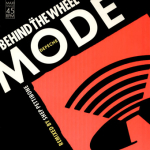
"Not unnaturally, since this is, after all, Depeche Mode, several odd noises immediately come into play here, not least the sound of a car hub cap falling off to begin the proceedings. A door then opens and - zwoom! - we're off at fairly moderate speed, Dave Gahan in the passenger seat, and some weird girlie (not only weird but no doubt a bit of a perv on the quiet, since Martin Gore wrote the thing) driving. And that's all that happens. Dave's "voice" travels no more than three notes up or down the scale, and the bumping one finger synthesiser beat surrounding the "jaunt" fares not much better. A bit weedy on the whole, and not much cop."
Unknown reviewer
Smash Hits, December '87/ January '88
Reprinted WITHOUT PERMISSION for non-profit use only.
LIVE REVIEWS
Hopeful Following for Depeche Mode
The Forum, Los Angeles - December 4-5, 1987
Music For The Masses Tour - USA and Canada leg
"There is little more incongruous than the sight of well-scrubbed, wide-eyed high schoolers at a Depeche Mode concert, singing along to the dark, solemn strains of songs such as "Black Celebration" and "Nothing."
Yet Depeche Mode's obsession with 'cause-tomorrow-we-die fatalism has struck a chord with middle-class teens, who turned out in droves Friday for the first of two sold-out shows at the Forum.
The Wild, the Innocent and the D. Mode Death Dance?
Death dance is as good a description as you'll find for songwriter Martin Gore's bleak themes and the moody, minor-key Germanic sound sculptures created by Gore and band mates Andrew Fletcher and Alan Wilder, who stood virtually passionless behind their keyboards.
And there's a blatant, although cartoonish, wild side in the rock-star prances, microphone-stand twirls and pelvic thrusts that singer David Gahan employed while mordantly intoning such lines as "I give in to sin, because you have to make this life livable."
But it's the innocence of those attracted to the band that is the most fascinating part of Depeche Mode's popularity.
"The music's about life," insisted one fan, going so far as to profess that the song "Fly on the Windscreen" (which wasn't performed Friday) is about a bug surviving in the midst of destruction, rather than the squashed bug metaphor of humanity's fate that the lyrics seem to spell out rather plainly.
"The songs say there's a chance," she said. "It's not all gloomy."
Don't think that these fans aren't really listening to the lyrics, though. The very fact that the songs present something to digest seems a key element in the band's fame.
Even though the conclusions some fans reach about the songs ring of youthful naivete, the observations reflect a point that was borne out in the band's set.
There is a life-affirming quality to many of Depeche Mode's songs, especially the likes of "Question of Lust," a ballad of vulnerability and hope sung movingly by Gore (attired in leather pants and a leather-and-chains bondage halter) as an encore. And, even while Gahan strutted and thrusted right over the varied, often subtle emotions contained in many other songs, a sense of optimism and tenderness came through.
The appeal of Depeche Mode to these young innocents isn't really much different than that of James Dean's "Rebel Without a Cause" character, representing the stage of life at which one yearns to be worldly, but lacks the emotional tools to deal with the world. That conflict itself is a subject of many of Gore's songs.
So, is the attraction of teens and young adults to the dark themes something for parents to worry about?
Not at all. The fact that so many at this show seemed able to grasp the positive messages behind the bleakness is a very good sign indeed. Let's hear it for innocence."
Steve Hochman
LA Times, 7th December, 1987
Reprinted WITHOUT PERMISSION for non-profit use only.
Depeche Mode, Pain and Synthesizers
Madison Square Garden - December 18, 1987
Music For The Masses Tour - USA and Canada leg
"ON its albums, Depeche Mode has been one of Britain's most consistent synthesizer bands. Above a mechanical beat and keyboards that pulse and peck and clank, David Gahan or Martin Gore, the band's songwriter, sings about love linked with pain and uncertainty, or about love as a provisional bulwark against despair. The music has rigorously economical counterpoint and a variety of synthesizer tones that make it stark yet catchy, and the band often uses Arab-inflected lines alongside pop melodies. Its better songs are ominous yet willfully hopeful, with dark undercurrents of dominance and submission.
But onstage Friday night at a sold-out Madison Square Garden, Depeche Mode in the flesh was unintentionally comical. Most of the band's music is canned, replayed in concert by the same computer programs that deliver it in the studio - so Mr. Gore, Andrew Fletcher and Alan Wilder stood on pedestals with keyboard setups, danced to the beat or mouthed lyrics, and occasionally laid a finger on a key. Now and then, Mr. Gore picked up a guitar or a melodica to make a non-electronic sound, but generally the band members seemed under-employed.
Meanwhile, Mr. Gahan disported himself like someone who had been watching MTV for years on end, the better to absorb every narcissistic rock-singer shtick. Shouting ''New York!'' and ''Hey!'' during instrumental passages, swinging his microphone stand, grinning a show-business smile, waving to the crowd, delivering exaggerated pelvic thrusts, he moved like a shopworn version of Rod Stewart. But he was singing about fear and depression. Mr. Gore, who occasionally replaced Mr. Gahan as lead vocalist, at least had the sense to stand still.
Since Depeche Mode has chosen to stick to cool, electronic music and troubled love songs - Mr. Gore is certainly craftsman enough to write more conventional dance tunes - it's odd to see Mr. Gahan strutting around like a would-be pop idol, apparently without irony. It seems Depeche Mode lacks the courage of its own despair."
Jon Pareles
NY Times, 20th December, 1987
Reprinted WITHOUT PERMISSION for non-profit use only.
